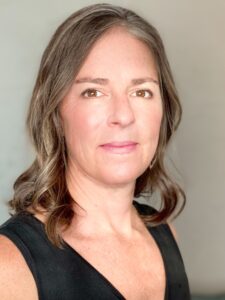Three geology and geophysics faculty members recently received awards and honors from Earth science professional societies.
Cari Johnson, William R. Dickinson Medal, Society for Sedimentary Geology

Cari Johnson
Download Full-Res ImageCari Johnson, professor and sedimentologist, won the William R. Dickinson Medal from the Society for Sedimentary Geology. The award recognizes “a mid-career research geoscientist who is significantly influencing the sedimentary geology community with innovative work.”
“Cari is tenacious in her pursuit of sedimentary geology innovation,” wrote fellow Geology and Geophysics professor Lauren Birgenheier in Johnson’s award citation. “Her work on sedimentary geology and its applications to tectonics is grounded in fundamental field-based science, and has advanced understanding of complexities and architecture in nonmarine, tidal and shallow marine depositional systems.”
The citation also mentions Johnson’s unwavering commitments to her roles as a mother, teacher, mentor, researcher and friend, “pursued always with a vulnerable excellence that inspires more.”
Johnson studies the sedimentary rock record to reconstruct deep-time landscapes, and to understand the geologic processes that controlled their evolution such as climate and tectonics.
Dickinson, the medal’s namesake, advised Johnson’s doctoral advisor and influenced her by his approach of “big picture” thinking and field-based data collection. Today’s students face daunting challenges, she said in her citation response, including diversity, equity and inclusion challenges, public perceptions and politics of science, and a global pandemic and climate crisis.
“We owe it to our students, not to mention the planet, to provide the best possible preparation,” she said. “And I don’t have the answers, but I think the solutions must still at least partly lie in the fundamentals championed by Bill Dickinson: observational skills, multi-disciplinary toolkits, creative and critical thinking, and the ability to communicate our science to a full range of stakeholders.”
Paul Brooks, Fellow, American Geophysical Union

Paul Brooks
Download Full-Res ImagePaul Brooks, professor and hydrologist, joins the 2021 class of American Geophysical Union Fellows. He is one of 59 Fellows announced this year. According to AGU, Fellows “have made outstanding achievements and contributions by pushing the frontiers of our science forward. They have also embodied AGU’s shared vision of a thriving, sustainable, and equitable future for all powered by discovery, innovation, and action. Equally important is that they conducted themselves with integrity, respect, diversity, and collaboration while creating deep engagement in education and outreach.”
Brooks’ award is for “fundamental advances in the dynamics of snowmelt and the understanding of watershed-scale hydrologic and biogeochemical processes.” He studies how climate interacts with the terrestrial environment (the earth’s surface where rock, water, life, atmosphere and the built environment interact) to control climate feedbacks and habitability. Much of his current work focuses on snow accumulation, snow melt, and water availability in mountain environments.
Brooks’ research group is working with colleagues from atmospheric science, engineering, and regional water managers to translate this fundamental research in to tools to manage water supplies in the face of climate change and growing populations throughout the west.
“Being named a fellow is an honor and in no small part refIects the excellent mentors I’ve had and the fantastic students, postdocs and colleagues I’ve been able to work with,” Brooks said.
Erich Petersen, Ralph W. Marsden Award, Society for Economic Geologists

Erich Petersen
Erich Petersen, professor emeritus and economic geologist, is the 2021 recipient of the Ralph W. Marsden Award from the Society for Economic Geologists (SEG). The award honors outstanding service to the Society and “exceptional stewardship and contributions to Society affairs.”
Over a 53-year career, Petersen studied various aspects of mineral deposits in the USA, Canada, Chile, Peru, Guatemala and Mexico, including the minerals’ geochemistry, mineralogy, exploration strategy and ore zoning patterns.
In the late 1980s, Petersen and William X. Chavez of the New Mexico Institute for Mining and Technology established one of the first SEG student chapters and began leading international field trip courses. When SEG launched the Student International Field Trip Program, Petersen and Chavez led 13 of the first 14 trips.
“Graduate and undergraduate students from over 49 countries and 56 universities encompassing 10 language groups and more that 8 ethnic backgrounds have participated,” Petersen says, “along with 100+ mentors including junior and senior mine and exploration geologists, national Geological Survey scientists, managers, CEO’s, historians, lawyers, economists, academic faculty, even seven SEG presidents!” The impact on student participants, he says, has been transformative.
He has personally known 11 previous Marsden Award recipients, and has long been an active participant in SEG, even contributing to establishing the Society’s first website.
“I suggest that Erich’s service to the society, and indeed to economic geologists worldwide, has been exemplary and demonstrates career-long dedication to excellence in education, research and service directed at students and fellow professionals of economic geology,” said Chavez in the award citation. “Many SEG and SEG student chapter related field and workshop courses that he has organized reflect his emphasis on distributing his personal wealth of knowledge and experiences.”
